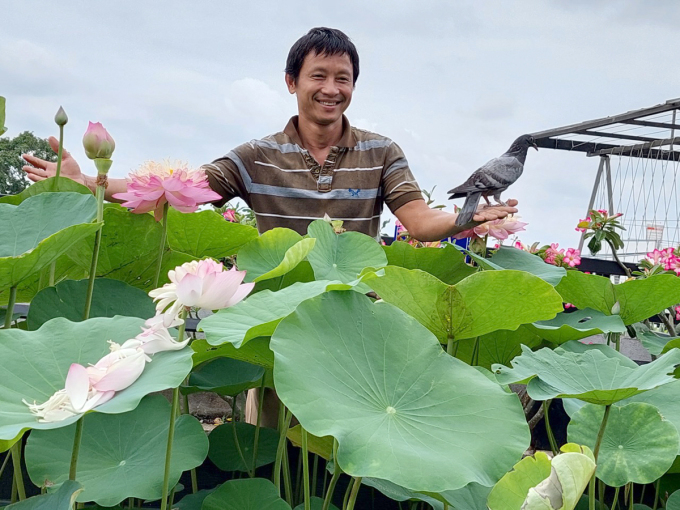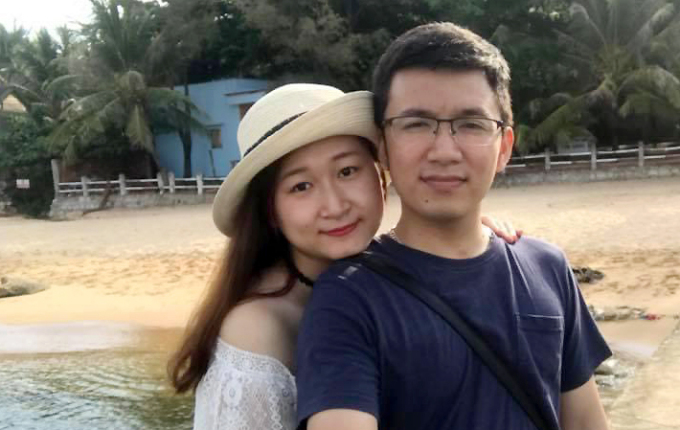Vietnamese share tips, tricks and roadmaps to achieve financial independence to be able to retire early, which seems to be the new mantra.
Nguyen Van Huynh, 50, and his wife decided to start their early retirement at the beginning of this year.
The couple living in HCMC’s District 12 now get up at 5 a.m. and go to the garden to water the plants and feed the birds. Once the children have left for school, they go shopping together or grab coffee with their friends.
He says the happiest time of the day for him is when the entire family goes to the rooftop garden to exercise and collect fruits after 5 p.m.
“Now is the time for me to wake up, sleep whenever I want and work whenever I want”.
 |
|
Nguyen Van Huynh in the 300-square-meter garden on the roof of his house in HCMC’s District 12. Photo courtesy of Huynh |
The Hanoi native divided his life into stages and worked hard to achieve his goal of retiring early.
He says 20-40 is the age for studying, working, investing, and accumulating. In their 40s people should reduce embarking on risky investment ventures and continue to save money. By 50 people can settle down and rest. When they reach 60 they should stop investing, working or doing anything to earn money.
He is still investing and doing some brokerage jobs, but not with the intention of earning lots of money; in fact, he solely uses this income for traveling and funding his hobbies.
He has a steady income from renting out properties, owning company shares and others.
According to a survey done at the end of 2021 by the Institute of Labor Science and Social Affairs, Huynh and his wife are among 28.4 percent of respondents who plan to live independently in old age.
Of more than 2,000 people who were polled, 41 percent plan to retire between the ages of 45 and 55, while nearly 39 percent plan to retire between 55 and the legal retirement age. More than half of urbanites intend to retire between 45 and 55.
Vietnam is gradually increasing the retirement ages to 62 for men and 60 for women from 60 and 55.
A survey by VnExpress earlier this month of over 4,300 readers found only 9 percent saying they will retire at the official retirement age.
An overwhelming 52 percent said they wanted to stop after the age of 50 but before the statutory retirement age, 32 percent plan to retire at 40-50 and 7 percent before 40.
Clearly, most people wish to retire early and some have executed plans to turn the desire into reality.
The survey also found that those who plan to retire early are primarily young people who have achieved success in business, IT, real estate, securities, cryptocurrencies, and others.
They all follow the FIRE (Financial Independence Retire Early) trend that has emerged around the world in recent years, whether intentionally or unintentionally.
Hung Nguyen, 30, of the northern Ninh Binh Province expects to reach financial independence within the next five years after accumulating US$1 million.
He owns a house in Hanoi and has VND8 billion (nearly $350,000) in other assets.
He graduated with a bachelor’s degree in law and practiced as a lawyer. But soon he realized it would not take him far and became a real estate broker at the age of 25. He then invested in stocks, foreign exchange and crypto.
He says he has primarily invested in cryptocurrencies over the last year, and earned an average of VND70-100 million a month. He is able to do most things on his own time, whether playing sports, resting or reading about cryptocurrencies.
“In fact, I’ve been living like a retiree for the past four years”. He wants to retire early because he dislikes a hectic lifestyle. “It doesn’t matter where I live as long as I’m close to nature”.
The desire to retire early has grown in the aftermath of the Covid-19 upheaval, but not everyone is able to achieve it.
Vietnam has 12.6 million people over the age of 60, of whom more than 4.3 million require care. More than 70 percent of them still work to earn a living.
Giang Thanh Long, director of the Institute of Public Policy and Management at the National Economics University, says during a country’s ‘golden’ demographic period, when for every two or more people working there is only one dependent person, some like the Japanese had a savings rate of 53 percent and reinvested the money in the economy to generate future incomes.
In contrast, Vietnam’s current golden population has a savings rate of only 28 percent.
However, one encouraging sign is that young people are becoming more aware of the importance of saving.
According to the CEO of an insurance company, in the past a majority of customers buying insurance were aged over 45, but now 25 percent are between 30 and 44.
Hong Tham and her husband, both 28, from the central province of Nghe An, work in the field of financial consultancy. Unlike most young Vietnamese, who want to travel or buy a house, they prioritize saving for retirement.
 |
|
Hong Tham with her husband. Photo courtesy of Tham |
Besides paying VND5 million a month for rent, the couple has also been paying the same amount into four different insurance policies for the past three years for their children’s education and her parents’ retirement.
Over the years their monthly income has increased from VND25 million to more than VND40 million, which also means the amount they can set aside for retirement has also increased.
Another change in the Vietnamese perception of retirement is that people are gradually abandoning the tradition of seniors depending on their children.
According to Trinh Van Tung, a sociology professor at the University of Social Sciences and Humanities, this philosophy is only associated with agrarian societies. However, in modern societies, an increasing number of people accumulate money to avoid reliance on their offspring.
“The most obvious change is the desire to be self-sufficient and not rely on the next generation”.
Huynh and his wife made the decision to retire early to protect their health and avoid feeling too “shocked” when they retire.
“When it comes to creating a retirement plan, the most important factor is knowing when it is enough for you. Even if you are financially secure and in good health, but if you only focus on caring for your children or grandchildren, you will still think you don’t have enough money”.
Huynh says many people ask why he did not wait for his children to grow up and hand over the business to them. His reply is that he does not want to work hard for another 10 or 20 years while waiting for my children to grow up.
“I also do not force my children to give up their own lives and passions to inherit the family business. The best way is to pause and devote all our energy to taking care of one’s own life”.
- Reduce Hair Loss with PURA D’OR Gold Label Shampoo
- Castor Oil Has Made a “Huge” Difference With Hair and Brow Growth
- Excessive hair loss in men: Signs of illness that cannot be subjective
- Dịch Vụ SEO Website ở Los Angeles, CA: đưa trang web doanh nghiệp bạn lên top Google
- Nails Salon Sierra Madre
 VnExpress News The News Gateway of Vietnam
VnExpress News The News Gateway of Vietnam





